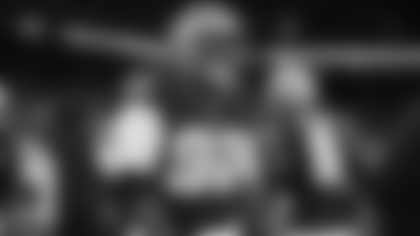The outlook wasn't particularly encouraging for Troy Aikman following the 1989 season, going from the high of being the first overall pick in the draft to what would be maybe the toughest rookie season any NFL quarterback has ever endured.
First-year Cowboys coach Jimmy Johnson decided not to slowly develop Aikman, instead throwing him to the wolves immediately. He stumbled to an 0-11 record (155 of 293 for 1,749 yards, 9 TDs, 18 INTs) as the starter his rookie season while Cowboys went 1-15.
Would you just look at him now, having been inducted into the Cowboys Ring of Honor in 2005 and a year later becoming the one of nine Dallas Cowboys to be inducted into the Pro Football Hall ofFame.
Aikman would eventually win three Super Bowl rings with the Cowboys, and led the team to four consecutive NFC championship games - 1992, 1993, 1994 and 1995 seasons, with victories in 1992, 1993, and 1995.
He was selected to six straight Pro Bowls from 1992-97. In the 1990s he would become the winningest quarterback of any decade with 90 wins in the 10-year span, all while compiling 47 Cowboys passing records, including resetting the bar in completions (2,742), passing yards (32,942) and touchdown passes (165).
On September 19, 2005, at halftime of the Cowboys-Redskins game, Aikman was inducted into the Cowboys Ring of Honor, along with his longtime teammates Michael Irvin and Emmitt Smith.
He was elected to the Pro Football Hall of Fame in Canton, Ohio, on Feb. 4, 2006, his first year eligible and was inducted on Aug. 5. In his third season (1991), Aikman and the Cowboys had turned the franchise's dismal fortunes completely around from the rough start his rookie year. The Cowboys qualified for the playoffs for the first time since 1985, Aikman turning in a passer rating of 86.7 while throwing for 2,754 yards, 11 touchdowns and completing 65.3 percent of his passes.
That high completion percentage would become an Aikman staple, the UCLA product finishing his 12-year NFL career fourth in all-time career completion percentage (61.5 percent). "I appreciate Troy Aikman because he resurrected the Dallas Cowboys in the 1990s, and he made it fun to watch them again," said fellow Hall-of-Fame Cowboys quarterback Roger Staubach.
In 1992 Aikman led the Cowboys to a Super Bowl win over Buffalo and earned the game's MVP honors while throwing for 3,445 yards and 23 scores that year. The team would go on to win three titles in four years.
After Aikman was named to the Hall of Fame, Johnson said the MVP performance in the first win over Buffalo cemented Aikman as "a championship quarterback, the greatest team player I was ever associated with.
"In my mind, I always judge a quarterback by how he plays in the big games. How does he perform in the playoffs? Troy Aikman always came up big in the big games."
Personnel changes would plague the Cowboys for the remainder of Aikman's tenure. His pass protection failed him repeatedly as the team began a decline, last winning a playoff game during his career following the 1996 season. Then on Dec. 10, 2000, at Texas Stadium, Washington Redskins linebacker LaVar Arrington sacked Aikman on a rollout pass, causing him to suffer his 10th concussion of his career. That would be his last NFL play, Aikman calling it quits the following off-season.
"(Aikman's) leadership and focus are what made us the team we were in the 1990s," Smith said after Aikman's Hall of Fame selection was announced. "I am happy for him because I know that he put in the time and hard work during his career to get to this point."
In 1997, his work with The Troy Aikman Foundation earned him the NFL's Walter Payton Man of the Year award, and marked his sixth consecutive season as a finalist for the honor.
In college, Aikman was the 1988 Davey O'Brien Award winner and College Quarterback of the Year. He was a Heisman finalist his senior season, and led the Bruins to a Cotton Bowl win over Arkansas.
All this after an 0-11, can't-get-worse start to his NFL career in 1989.
Born Nov. 21, 1966, in West Covina, Califorina.






